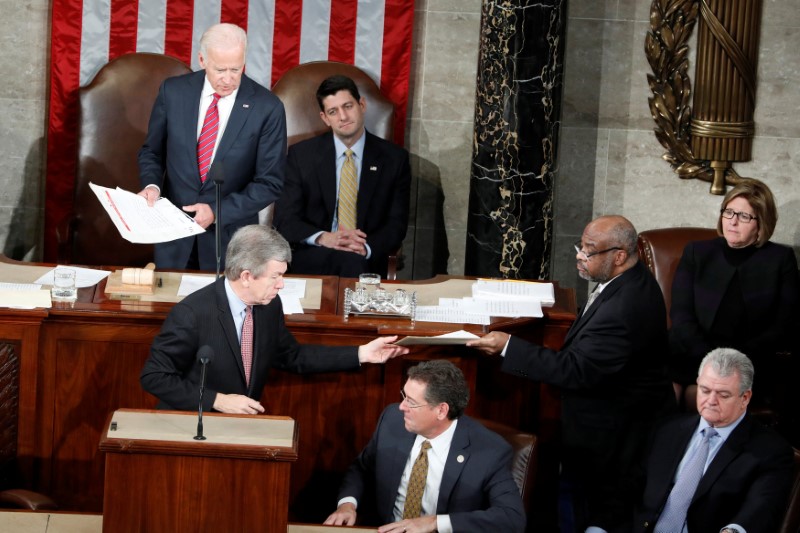By Doina Chiacu and Susan Cornwell
WASHINGTON (Reuters) - The U.S. Congress on Friday certified the Electoral College vote that gave Republican Donald Trump his victory in the contentious 2016 presidential election after a raucous half-hour joint session punctuated by Democratic challenges.
The Republican businessman, whose presidential campaign was his first bid for public office, garnered 304 electoral votes, compared with 227 won by his Democratic challenger, Hillary Clinton, according to the vote tally read by Vice President Joe Biden.
The electoral votes were opened before a joint session of Congress in what is considered a formality for most presidential elections.
Members of the House of Representatives objected to the electoral tally in states including Alabama, Florida, Michigan, Texas, Mississippi and the Carolinas in a symbolic move that exposed lingering dismay over a contentious election campaign.
Some members complained about long lines at polling stations while others cited concerns over Russian attempts to influence the result in Trump's favor.
"I object because people are horrified by the overwhelming evidence of Russian interference in our election," said Representative Barbara Lee of California before being overruled.
Biden denied the objections one by one, at times jocular and apparently determined to finish the tally. "It is over," he said at one point, to laughter from Republicans.
None of the representatives had the backing of a senator, which would have allowed them to suspend the joint session and allow the House and Senate to meet separately to debate the objections.
Although Trump, who is set to take office on Jan. 20, won the Electoral College vote that determines the victor, Clinton won the popular vote by nearly 3 million ballots. The election has been shadowed by concerns about Russian hacking of Democratic groups and other forms of intervention during the campaign.
Trump, who has repeatedly downplayed possible Russian interference, was due to receive a U.S. intelligence report on the situation later on Friday. He told The New York Times on Friday that the focus on the issue was a "political witch hunt."
The intelligence agencies did not conclude that Russian hacking changed any vote tallies.
But House Democratic leader Nancy Pelosi said concerns about Russian interference cast a pall over the 2016 vote.

"That's why people have some level of dismay today on the vote ... about the Electoral College," Pelosi said at a news conference. "How much is known about the foreign disruption of our election?"